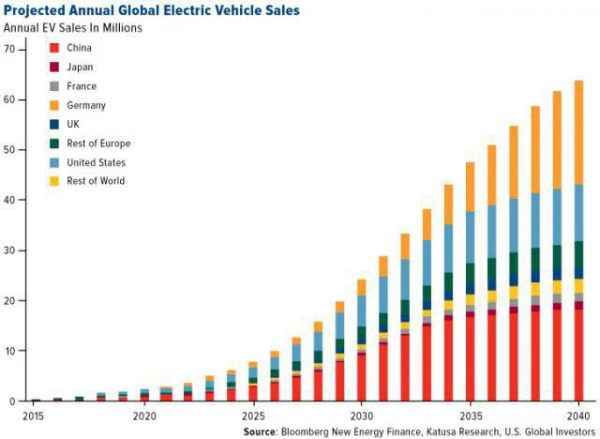Automotive companies around the world are investing billions into lithium-ion battery technology with the number of EV cars on roads steadily increasing every day. There are currently more than 128,000 pure-electric cars registered in the UK, that number rises to over 315,000 when including plug-in models such as hybrids. The National Grid suggests that the UK stock of EVs could rise as high as 36 million by 2040. During the first five months of 2020, registrations of pure-EVs have increased by 60% compared to the same period in 2019. In perspective, both the petrol and diesel markets declined by more than 90% during these months due to the coronavirus crisis.
A poll from 2018 of over 10,000 drivers, found the following views on electric cars:
- 85% said that there aren’t enough public charging points for EVs.
- 76% said EVs could not go far enough on a single charge.
- 76% think EVs are too expensive.
- 67% think EVs take too long to charge.
Since this survey was taken progress continues to be made in each area; there are now more public charging points than petrol stations in the UK and new models increasingly have a range of over 200 miles. With the costs of EVs gradually reducing, it is a matter of when, not if, EVs will become the mainstream.
With the focus having been on the production of new lithium-ion batteries, there are questions over the battery aftermarket and the reverse supply chain. When manufactured, batteries are not created with a ‘second life’ in mind, and like the battery in your phone, over time lose capacity to a point where they are no longer fit for purpose. This is widely agreed upon at the 75% threshold.
The ‘second life’ poses challenges to OEMs, who need to find ways of maximising value recovery for both in and out of warranty batteries and drive customer satisfaction when a battery fails while also improving inventory forecasting despite performance profiles remaining unclear.
The cost of cobalt, nickel and lithium will remain high in the years to come, how OEMs recycle, refurbish and reuse batteries becomes increasingly essential. Inevitably stockpiles of batteries will continue to grow for both aftermarket and reverse supply chain purposes with increased risks due to their volatility in certain conditions, leading to thermal runaway events that may make them highly dangerous.
The complexity and variance of lithium-ion chemistry and the lack of information in the ability to identify and contain the different gases released is a cause for significant concern. Anticipating a thermal runaway event can be monitored in several ways; temperature, gas, electrical, etc., thus creating the ability to intervene and take action before fires/explosions take place saving the battery, the immediate surroundings and quite possibly lives.
“Battery technology and battery safety are central catalysts to the future of the EV industry across an in-production to aftermarket lifecycle that covers manufacture, handling, moving, storage and afterlife. And it is this ‘final’ phase – which addressed appropriately can give rise to ‘second life’ – which is rightly gaining more focus with the acceleration of attention on sustainable mobility as working, commuting and overall travel behaviours have ‘reset’ in the continuing impacts of COVID19. This also aligns with the rise of ‘Conscious Consumerism’ – people increasingly expect a transparent tangible commitment with action on sustainability, which is already affecting buying and advocacy practices.”
Prof. Sally Eaves
The need for a practical supply chain solution to tackle these challenges is essential to ensure safety, value returns and for the industry to recognise the full environmental benefits of EVs.
As the UK’s leading automotive logistics provider, Unipart Logistics has been there throughout the decades alongside the world’s top brands as automotive supply chains have evolved. Today, Unipart also create bespoke, agile and cost effective solutions to optimise and deliver on customer service pressures in the Utilities Sector, including supporting the expansion of EV charging infrastructures. Unipart’s capabilities in maximising efficiencies and productivity of large scale engineering workforces places Unipart in a position to offer complete EV strategic, tactical and operational support to both Utilities and Automotive customers alike. Through continuing to develop safe, reliable and flexible reverse supply chain end-to-end solutions with added value for all OEMs, Unipart’s customers, today, hold a 47% market share of all UK registered EVs.

